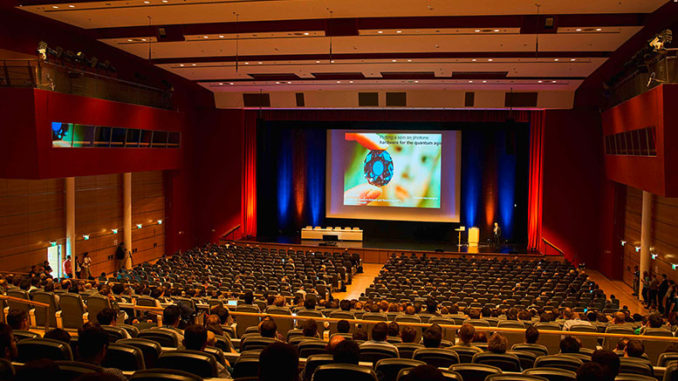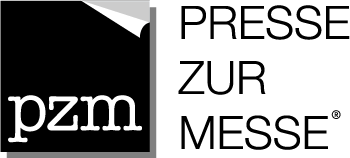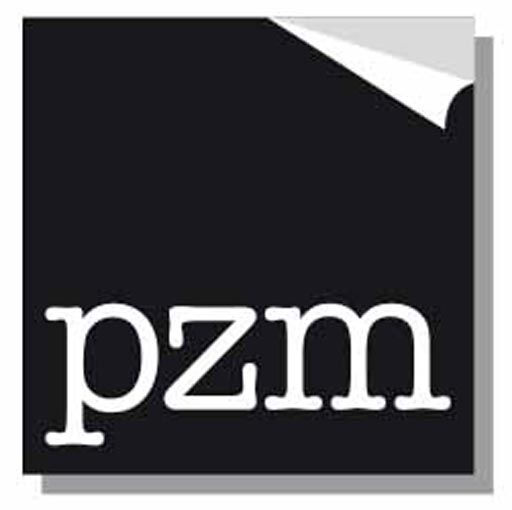
When Nobel Prize winners, technology pioneers and world-leading scientists from all fields of photonics stream to Munich, it is World of Photonics Congress again. The leading congress for photonics in Europe will take place from June 23 to 27, 2019 at the ICM – Internationales Congress Center München on the Messe München site concurrently with LASER World of PHOTONICS, the world’s leading trade fair, from 24–27 June 2019 in the directly adjoining exhibition halls.
Prof. Karsten Danzmann will host both the opening plenary discussion at LASER World of PHOTONICS 2019 and the World of Photonics Congress 2019. In his opening speech ‘Listening to the universe with gravitational waves’, he will address methods for the detection of gravitational waves and the development of laser technologies that these methods require. Prof. Danzmann is the Director of Max Planck Institute for Gravitational Physics (Albert Einstein Institute) where he heads the division Laser Interferometry and Gravitational Wave Astronomy. Another high-class follows the same day in the evening: Together with Donna Strickland Prof. Gérard Mourou was awarded the Nobel Prize in Physics in 2018. On Monday, June 24 (18:00–19:00), he will hold his Nobel Prize Plenary with the title “A Passion for Extreme Light” in Munich. The following Tuesday, June 25 (14:00–14:30), the newly awarded Herbert-Walther Prize winner 2019, Prof. Sir Peter Knight, will hold his Award lecture “The Journey from Manipulating Single Quantum Systems to Quantum Information Processing”. And so it goes on—one after the other: Seven conferences, more than 6,500 participants who participate in the congress and in the Application Panels, several thousand scientific and practice-oriented lectures make the World of Photonics Congress an event of superlatives.
The five conference days at the ICM cover the entire universe of today’s photonics research—and offer no less than 14 top-class plenary speakers. In addition, there are dozens of tutorial lectures and invited lectures as well as a short course program for students and other interested parties, and also various practical application panels in the adjoining halls as part of LASER World of Photonics 2019.
The Conference Program of the World of Photonics Congress
The World of Photonics Congress is home to seven sub-conferences that span the spectrum from basic research to application-oriented development. Worldwide leading research institutes and companies from the field of photonics stand behind the organization and the comprehensive lecture program.
- CLEO®/Europe-EQEC: The “Conference on Lasers and Electro-Optics and the European Quantum Electronics Conference” is the biggest conference at the Congress. It comprises 982 oral lectures and 896 poster presentations plus plenary, tutorial and invited talks. Overall, 2,006 presentations will be given. The conference is organized by the European Physical Society (EPS), the Quantum Electronics and Optics Division (QEOD), the Optical Society (OSA) and the IEEE Photonics Society. The EQCD focusses on the dynamic field of quantum optics, while. CLEO®/Europe will present the latest developments in laser source development, ultrafast science, fibre optics, nonlinear optics or optical telecommunications, nanophotonics and terahertz sources. Plenary lectures by Michal Lipson, Columbia University, New York, USA, on Silicon Photonics and Anton Zeilinger, Institute of Quantum Optics and Quantum Information at the Austrian Academy of Sciences, Vienna, on Entanglement will provide highlights in both fields.
- European Conferences on Biomedical Optics (ECBO): This sub-conference brings together experts from the field of biophotonics and is dedicated to the latest trends in medical imaging; from (pre-) clinical optical diagnostics via optical coherence imaging and diffuse optical spectroscopy to advanced microscopy and medical application. ECBO is sponsored by the scientific societies The International Society for Optics and Photonics (SPIE) and The Optical Society (OSA). Plenary speaker Prof. Brian Wilson, University of Toronto, will set a Light upon Photo Medicine, Radiation Medicine and Nano Medicine as “An Emerging Golden Braid”. Another highlight: The presentation of the OSA Michael S. Feld Biophotonics Award, to 2019 winner Valery Tuchin (Saratov State University, Tomsk State University and Institute of Precision Mechanics and Control of the RAS (Russian Federation).
- The European Optical Society (EOS) presents the “EOS Optical Technologies” with two sub-conferences: the “Conference on Manufacturing of Optical Systems” and the “Conference on Optofluidics”. They deal with the manufacture and testing of optics and optical systems. And they look at the latest trends in the integration of optics and microfluidics. Participants can look forward to Plenary Speaker Hatice Altug, École polytechnique fédérale de Lausanne, Switzerland, who will speak about “Nanophotonic metasurfaces for biosensing” Prof. David Walker, University of Huddersfield , will give a lecture about “The Future of optical Fabrication—Demand, Supply and Technology”.
- LiM Lasers in Manufacturing, which is organized by the Wissenschaftliche Gesellschaft für Lasertechnik (WLT), in cooperation with the Association of Industrial Laser Users (AILU), the European Laser Institute (LIA), the Japan Laser Processing Society (JILPS) and Swissphotonics, is setting three priorities: Micro Processing, Macro Processing and Additive Manufacturing. Plenary Speaker Prof. Dr. Reinhart Poprawe, Managing Director of the Fraunhofer Institute for Laser Technology ILT, Aachen, Germany, will focus on “Industry 4.0 and its Role in Laser Technology”.
- Optical Metrology will play a key role in Industry 4.0. A conference of the same name during the WoP-Congress, organized by SPIE Europe in cooperation with WLT and EOS, will present latest trends in the field of measurement systems and optical metrology, videometrics and modeling as well as the growing market of automated visual inspection and machine vision. Other topics: Vehicle navigation, multimedia technology, architecture, archaeology and the arts—and a new one: Multimodal sensing in combination with artificial intelligence. A plenary lecture entitled “Towards a complete framework for calibration of optical surface and coordinate measuring instruments” will be given by Prof. Richard Leach, University of Nottingham, UK.
- A related topic will be the subject of another SPIE-conference: Digital Optical Technologies, which puts the spotlight on novel optics for Augmented, Mixed and Virtual Reality Systems, computational optics for display and imaging, digital optics for image formation as well as on switchable, tuneable and digitally reconfigurable optics or digital optics for sensing and authentication. Dr. Christine Guillemot, Director of Research at the Institut National de Recherche en Informatique et Automatique (INRIA) in France, dedicates her plenary lecture to the topic “Light field image processing: overview and research problems”.
- The seventh and last conference of the WoP-Congress 2019 is the Imaging and Applied Optics Congress, organized by OSA. Leading international experts will give deep insights in four main topics of the conference: Computational Optical Sensing and Imaging, Imaging Systems and Applications, Mathematics in Imaging and Propagation through and Characterization of Atmospheric and Oceanic Phenomena. Dr. Domenico Bonaccini Calia, who has been working as a physicist at the European Southern Observatory for over 24 years, will talk about “The Ongoing Adaptive Optics Revolution” while Prof. Dongheui Lee from TU Munich, Germany, will share her insights in “Robot learning from Human Guidance”.
The Word of Photonics Congress 2019 will build bridges from quantum technology to automated industrial inspection, from learning robots to photonics in climate research and medical diagnostics, from virtualized digital twins of machines and factories in Mixed Reality to optical metrology in the sub-nanometer range. Or from attosecond flashes to laser-based X-rays or new, even faster approaches in optical communication. Photonics is the enabler in all these applications. It allows us to understand the world, ensures rapid worldwide data exchange and is the key to future autonomous and electrified mobility. The World of Photonics Congress 2019 brings together over 6,500 participants from all over the world for the congress and the Application Panels—who will jointly explore the entire universe of modern photonics in Munich.
Bild & Text: world-of-photonics.com

